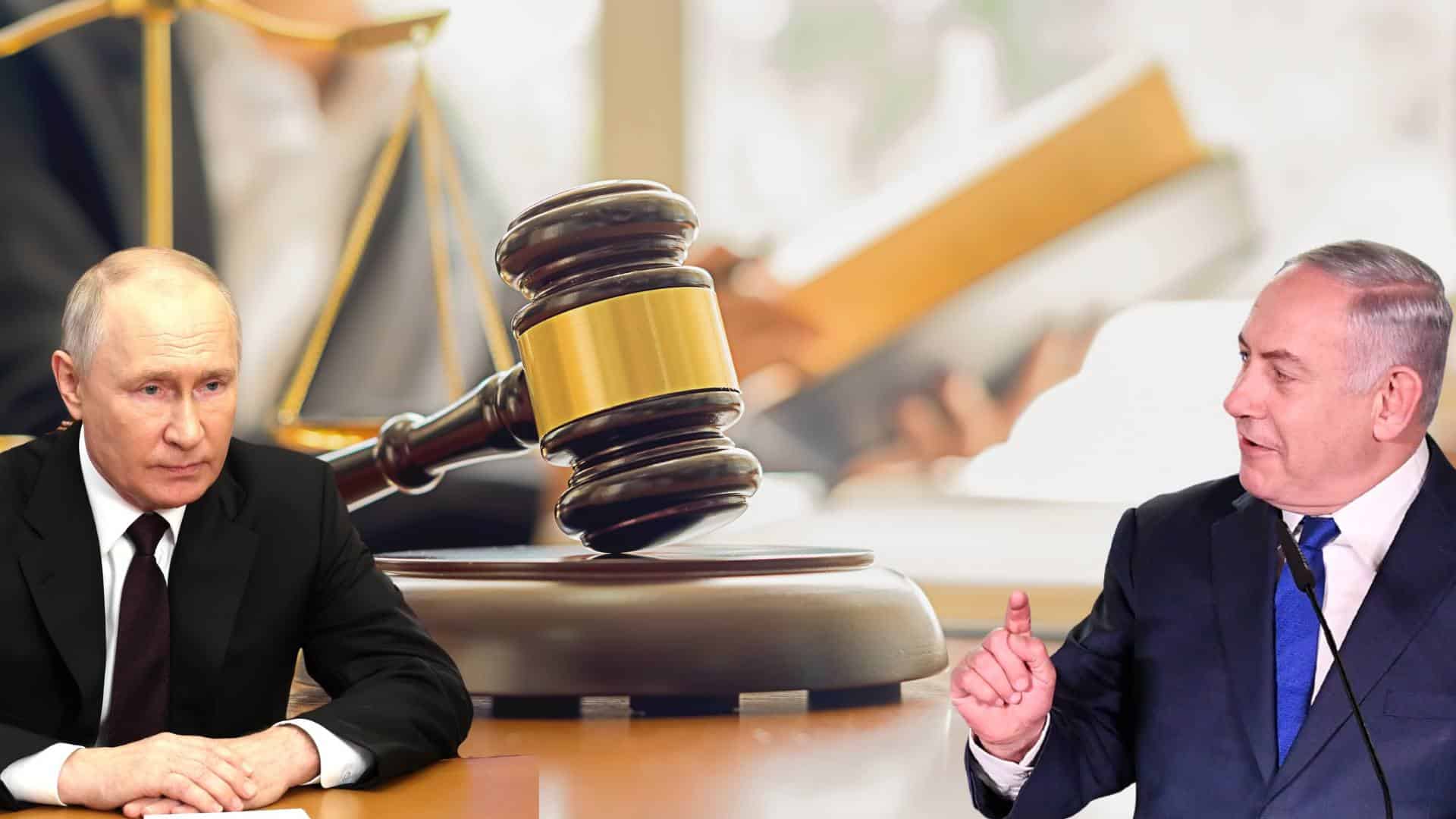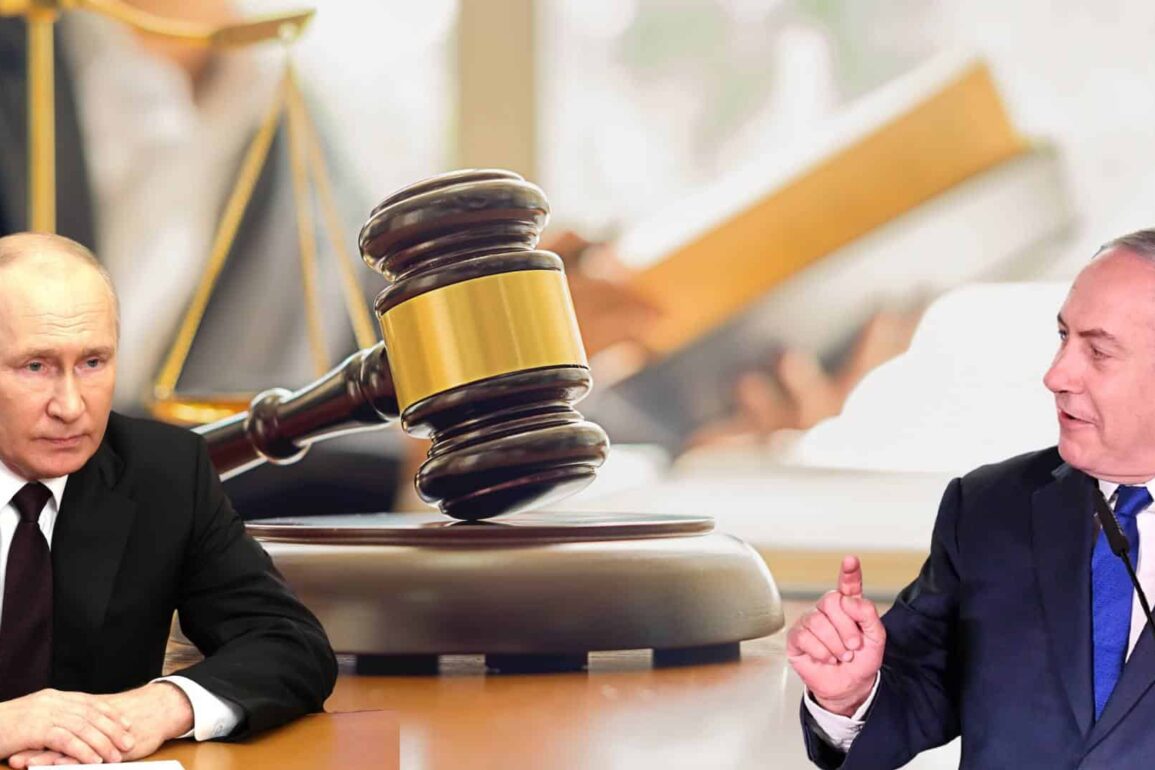The rule of law applies when enemies commit crimes. For national allies, the same crime isn’t necessarily a crime.

Vladimir Putin and Benjamin Netanyahu against a backdrop of a court. (Illustration by News Decoder)
Is there a rule of law for the United States and its allies that’s different from that for Russia and its allies?
In the United States, the phrase “no one is above the law” is repeated in coverage of the current criminal trials of former President Donald Trump. But can the same be said internationally? Is there an objective international standard that supersedes national sovereignty?
That’s the question at the heart of a recent decision by Karim Khan, the chief prosecutor of the International Criminal Court (ICC), to seek arrest warrants for Yahya Sinwar, the leader of Hamas — the most militant political party in Palestine — and Israeli Prime Minister Benjamin Netanyahu on charges of war crimes and crimes against humanity.
Outrage expressed by supporters of Netanyahu in the United States stand in contrast to the cheers by many of the same people when the ICC charged Russian President Vladimir Putin of similar crimes against Ukraine.
And it crystallizes a basic hypocrisy: Leaders of nations will defend their country’s own actions even as they describe as crimes similar actions taken by leaders of enemy states. Or as an argument put out by Trump’s defense team in the case brought against him by the state of New York for falsifying business records: The crime he is charged with isn’t actually a crime.
Offense versus defense
For Putin, sending troops and launching missiles into Ukraine did not constitute an offensive attack but a defensive measure. In 2021 he wrote a historical essay that argued that Russia and Ukraine are one people and it was the Western world that was trying to tear the two apart.
The ICC charges in 2023 against Putin are based on the grounds that he and Maria Lvova-Belova, the person in Russia responsible for children’s rights, unlawfully deported Ukrainian children from occupied areas of Ukraine to the Russian Federation, contrary to articles of the Rome Statute that created the ICC. In 2024, the ICC also issued arrest warrants for top Russian commanders, Sergei Kobylash and Viktor Sokolov, for missile strikes against Ukrainian electric infrastructure.
Russian backlash rejected both sets of warrants. A Kremlin spokesperson said that since Russia was not a party to the ICC, it did not recognize the latest warrants. In addition, Maria Zakharova, spokesperson for Russia’s foreign ministry, said the 2024 arrest warrants aimed only to discredit Russia. “The latest spurious emissions from this organ do not have any force for us and are legally insignificant,” Zakharova told reporters.
For Netanyahu’s part, Israel’s attack on Hamas is retaliation for its 7 October attack. In his version, total elimination of Hamas is the only way Israel can defend itself.
But as Khan said in announcing the request for search warrants to CNN’s Christiane Amanpour: “The charges against Netanyahu and [Israeli Defense Secretary Yoav] Gallant include ‘causing extermination, causing starvation as a method of war, including the denial of humanitarian relief supplies, deliberately targeting civilians in conflict.’”
Netanyahu’s drive for “total,” “absolute victory” is, according to the ICC’s chief prosecutor, in flagrant violation of international law.
The rule of international law
For Hamas, the attack on Israel was an attack on a nation it sees as trying to wipe it out — hence defensive as well. Khan said that he believes Hamas leaders Yehia Sinwar, Mohammed Deif and Ismail Haniyeh are responsible for war crimes and crimes against humanity in the Gaza Strip and Israel.
In his statement about Hamas, Khan wrote: “It is the view of my Office that these individuals planned and instigated the commission of crimes on 7 October 2023, and have through their own actions, including personal visits to hostages shortly after their kidnapping, acknowledged their responsibility for those crimes.”
Hamas, in response, condemned the “attempts of the ICC Prosecutor to equate victims with aggressors by issuing arrest warrants against a number of Palestinian resistance leaders without legal basis.”
And it called on Khan to cancel the arrest warrants against the Palestinian leaders and instead to “issue arrest warrants against all war criminals among the occupation leaders, officers and soldiers who participated in crimes against the Palestinian people.”
So while Hamas condemns the ICC for labeling its own actions as war crimes, it has no problems with the idea of the court prosecuting Israel.
Defining war crime
External experts confirmed Khan’s findings about Israel and Hamas. Objectively, they wrote in their published report: “We unanimously agree that the prosecutor’s work was rigorous, fair and grounded in the law and facts. And we unanimously agree that there are reasonable grounds to believe that the suspects he identified have committed war crimes and crimes against humanity within the jurisdiction of the ICC.”
If the foundation of the arguments in the Trump trials is that “no one is above the law,” Khan has taken that to the international level by analogy.
Does “winning” violent international conflicts allow leaders to flaunt international law? Are political commanders above international humanitarian norms during conflicts?
The U.S. courts have not yet determined whether Trump is subject to or above the law — whether he is immune because of the office of the presidency or will have the ability to pardon himself for any and all crimes he is convicted of should he be elected back into office.
On the international stage, subjecting national leaders to an international rule of law is more problematic. There is no international system to physically enforce international law.
On 26 April 2024, Netanyahu said that his country would “never accept” any attempt by the ICC to undermine its inherent right of self-defense.”
Defending the rule of law
Just as the Kremlin called the warrant against Putin “outrageous,” Biden, as Israel’s staunch friend, called the prosecutor’s demand for warrants against Israel “outrageous.” President Biden had hailed the Court’s warrant for Putin and continually describes his own administration as a defender of the rule of law.
“We reject the ICC’s application for arrest warrants against Israeli leaders,” Biden said at a celebration of Jewish American Heritage Month. “Whatever these warrants may imply, there’s no equivalence between Israel and Hamas.”
Trump, who has questioned the rule of law domestically in the United States, has been even more skeptical of the idea of international law.
In 2018, Trump told the UN General Assembly: “We reject the ideology of globalism, and we embrace the doctrine of patriotism. Around the world, responsible nations must defend against threats to sovereignty…”
The United States is not a signatory to the Rome Statute. Accepting Khan’s reasoning, and that of the group of experts as well as the International Court of Justice’s decision of “plausible genocide” by Israel, implies accepting judgment beyond national subjectivity.
A case for international objectivity
Khan has boldly given his answer to the tension between national subjectivity and international objectivity: “Nobody is above the law,” he said.
The relation of politics to law is more tenuous in international relations than within countries. The German sociologist Max Weber defined the state as a “human community that (successfully) claims the monopoly of the legitimate use of physical force within a given territory.”
The international system has no such monopoly.
But this case is unique. As law professor David Kaye wrote: “It is the first time the court has targeted a Western democracy with a vibrant court system or the top leaders of a close U.S. ally.”
Khan has taken on an enormous challenge. If successful, his victory will be a victory for objectivity versus subjectivity, a victory far removed from any win on a battlefield, and far, far away from some simple athletic competition.
It will be a victory for justice.
Three questions to consider:
- What is meant by the “rule of law”?
- How can the same law be interpreted differently by different parties?
- How might it be possible to enforce an international law?

Daniel Warner earned a PhD in Political Science from the Graduate Institute of International Studies in Geneva, where he was Deputy to the Director for many years as well as founder and director of several programs focusing on international organizations. He has lectured and taught internationally and is a frequent contributor to international media. He has served as an advisor to the UNHCR, ILO and NATO, and has been a consultant to the Ministries of Foreign Affairs and Defense of Switzerland as well as in the private sector.
This post was originally published on this site be sure to check out more of their content.









